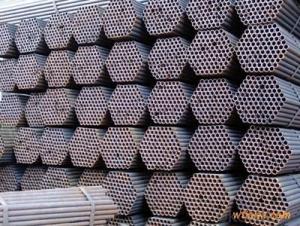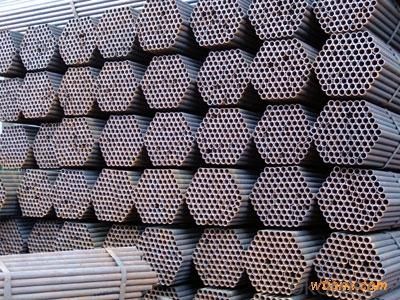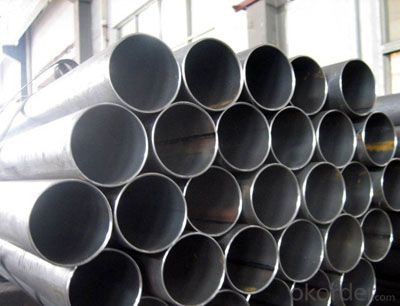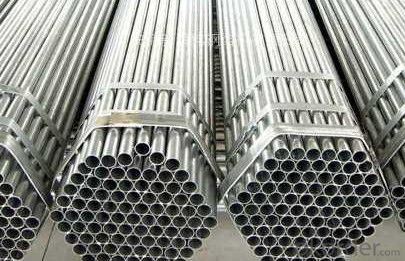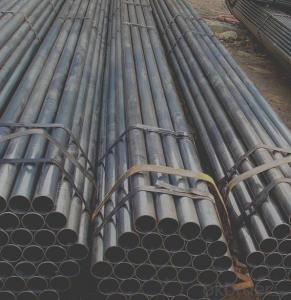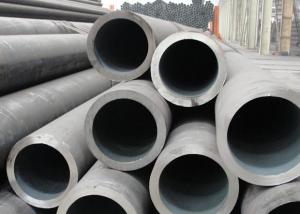Steel Pipe GB9711.2 for Conveying Gas Oil Petrolum
- Loading Port:
- Tianjin
- Payment Terms:
- TT OR LC
- Min Order Qty:
- 25 m.t.
- Supply Capability:
- 9000 m.t./month
OKorder Service Pledge
OKorder Financial Service
You Might Also Like
1、Welded Gas steel Pipe GB9711.2:
GB9711.2 Gas steel pipe is electric resistance welding, the abbreviation for Oil for transporting oil and natural gas vapor liquid objects, can meet the requirements of high and low pressure, the transport in the world with pipe sector accounted for a pivotal position.
2、Main Features of Welded Black Gas steel Pipe GB9711.2:
• High manufacturing accuracy
• High strength
• Good visual effect
• Reasonable price
• Small inertia resistance
• Strong heat dissipation ability
3、Welded Black Gas steel Pipe Specification GB9711.2:
Standard | GB, DIN, ASTM ASTM A106-2006, ASTM A53-2007 |
Grade | 10#-45#, 16Mn 10#, 20#, 45#, 16Mn |
Thickness | 1 - 33 mm |
Section Shape | Round |
Outer Diameter | 21 - 610mm |
Place of Origin | Tianjin, China (Mainland) |
Secondary Or Not | Non-secondary |
Application | Hydraulic Pipe |
Technique | Cold Drawn |
Certification | API |
Surface Treatment | factory state or painted black |
Special Pipe | API Pipe |
Alloy Or Not | Non-alloy |
Length | 5-12M |
Outer Diameter | 21.3-610mm |
Grade | 20#, 45#, Q345, API J55, API K55, API L80, API N80, API P110, A53B |
Standard | ASME, ASTM |
1) Material:20#(ASTM A 106/A53 GRB.API5LGRB,GB),45#,16Mn,10#.
2) Specification range:OD:21.3-610mm,WT:6-70mm,length:6-12m or according to the requirement of clients.
3) Excutive standards:GB,ASME API5L.ASTM A 106/A53,Despite of the above standards,we can also supply seamless steel pipe with standard of DIN,JIS,and so on,and also develop new products according to the requirements of our clients!
4) Surface:black lacquered,varnish coating or galvanized.
5) Ends:Beveled or square cut,plastic capped,painted.
6) Packing:bundles wrapped with strong steel strip,seaworthy packing.
4、Packaging & Delivery
Packaging Details: | seaworthy package,bundles wrapped with strong steel strip |
Delivery Detail: | 15-30days after received 30%TT |
5、FAQ of Welded Black Gas steel Pipe GB9711.2:
①How is the quality of your products?
Our products are manufactured strictly according to national and internaional standard, and we take a test
on every pipe before delivered out. If you want see our quality certifications and all kinds of testing report, please just ask us for it.
Guaranteed: If products’ quality don’t accord to discription as we give or the promise before you place order, we promise 100% refund.
②How about price?
Yes, we are factory and be able to give you lowest price below market one, and we have a policy that “ for saving time and absolutely honest business attitude, we quote as lowest as possible for any customer, and discount can be given according to quantity”,if you like bargain and factory price is not low enough as you think, just don’t waste your time.Please trust the quotation we would give you, it is professional one.
③Why should you chose us?
Chose happens because of quality, then price, We can give you both.Additionally, we can also offer professional products inquiry, products knowledge train(for agents), smooth goods delivery, exellent customer solution proposals.Our service formula: good quality+good price+good service=customer’s trust
SGS test is available, customer inspection before shipping is welcome, third party inspection is no problem.
6、 Welded Black Gas steel Pipe Images GB9711.2:
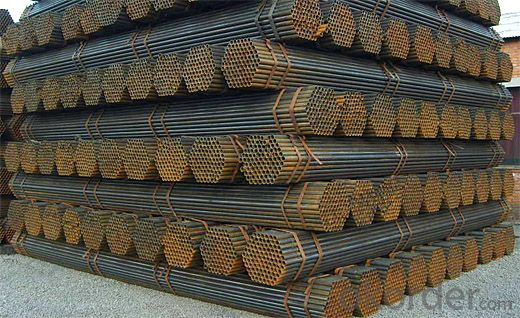
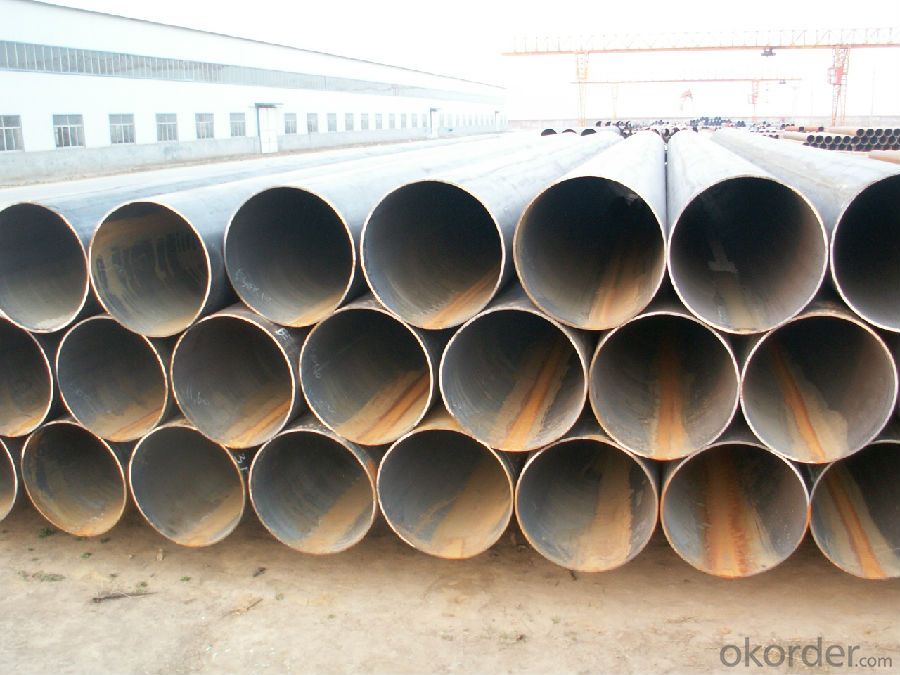
- Q: What does GALV mean in a steel tube?
- Steel pipe is not only used to transport fluid and powder solid, exchange heat energy, and manufacture mechanical parts and containers, but also is an economic steel. It can reduce weight and save 20 to 40% of metal by using steel pipe to make building structure, network frame, prop and mechanical support. Moreover, it can realize factory mechanization construction. Using steel pipe to manufacture road bridge can not only save steel, simplify construction, but also greatly reduce the area of coating protective layer, save investment and maintenance cost.
- Q: How are steel pipes used in the manufacturing of chemical storage tanks?
- Steel pipes are commonly used in the manufacturing of chemical storage tanks as they provide durability, strength, and corrosion resistance. These pipes are utilized for the construction of the tank's framework and support system, ensuring stability and structural integrity. Additionally, steel pipes are often employed for the installation of inlet and outlet connections, allowing for the safe and efficient transfer of chemicals in and out of the tank.
- Q: What are the different methods of pipe joining for steel pipes?
- The different methods of pipe joining for steel pipes include welding, threaded connections, flanged connections, and grooved connections. Welding involves melting the two ends of the pipes together to form a strong bond. Threaded connections involve screwing the pipes together using thread tape or sealants to create a tight seal. Flanged connections use flanges and bolts to join the pipes together, providing a secure and leak-proof connection. Grooved connections involve using grooved couplings and gaskets to connect the pipes, allowing for quick and easy installation.
- Q: How do you calculate the pressure drop in a steel pipe?
- To calculate the pressure drop in a steel pipe, you need to consider factors such as the pipe diameter, length, flow rate, and fluid properties. The pressure drop can be determined using various formulas, such as the Darcy-Weisbach equation or the Hazen-Williams equation, depending on the specific conditions and assumptions made. These equations take into account factors like pipe roughness, viscosity, and Reynolds number to determine the pressure drop across the pipe.
- Q: What is the difference between steel pipes and FRP pipes?
- Steel pipes and FRP pipes are commonly used in various industries and applications, but they differ in several ways: 1. Material Composition: Steel pipes are constructed from iron and carbon alloys, along with elements like manganese, silicon, and small amounts of other metals. Conversely, FRP pipes consist of a polymer matrix reinforced with fibers such as glass or carbon. 2. Strength and Durability: Steel pipes are renowned for their exceptional strength and durability, enabling them to endure high pressures, heavy loads, and extreme temperatures. Although FRP pipes are also strong and durable, they are comparatively lighter in weight and may not possess the same level of strength as steel pipes. Nonetheless, they excel in corrosion resistance and have a longer lifespan in corrosive environments. 3. Corrosion Resistance: Steel pipes are susceptible to corrosion and thus require protective coatings or linings to prevent rust and deterioration. In contrast, FRP pipes possess inherent corrosion resistance and do not necessitate additional coatings. Consequently, they are well-suited for transporting corrosive fluids or functioning in corrosive environments. 4. Installation and Maintenance: Installing steel pipes necessitates specialized welding or threading techniques. Consequently, installation can be more labor-intensive and time-consuming, particularly for complex or large-scale projects. Conversely, FRP pipes are lightweight and easily transportable and installed. Often arriving in pre-fabricated sections, they expedite installation, reduce labor requirements, and demand minimal maintenance in comparison to steel pipes. 5. Cost: Generally, steel pipes are more expensive than FRP pipes due to the higher cost of raw materials and the need for additional corrosion protection measures. FRP pipes offer a cost-effective alternative, particularly in applications where corrosion resistance is paramount, as they eliminate the necessity for expensive coatings or linings. Ultimately, the selection between steel pipes and FRP pipes depends on the specific requirements of the application. Steel pipes are favored for their high strength, whereas FRP pipes offer advantages such as corrosion resistance, lightweight construction, and cost-effectiveness.
- Q: What are the different types of steel pipe coatings for drinking water pipelines?
- There are several types of steel pipe coatings used for drinking water pipelines, including fusion bonded epoxy (FBE), polyurethane (PU), and polyethylene (PE). These coatings provide corrosion protection, prevent leaching of contaminants into the water, and ensure the durability of the pipes.
- Q: What's the difference between hot dip galvanizing and cold galvanizing? Which kind of galvanizing method is good?
- There are two kinds of hot dip galvanizing, zinc plated and non galvanized. The flowers must be hot-dip galvanized, without flowers, similar to galvanized.
- Q: What is the difference between black steel pipe and galvanized steel pipe?
- The main difference between black steel pipe and galvanized steel pipe lies in their coating. Black steel pipe is untreated and has a dark, matte appearance, while galvanized steel pipe is coated with a layer of zinc to prevent rusting and has a silver, shiny appearance. This coating makes galvanized steel pipes more durable and suitable for outdoor use, while black steel pipes are commonly used for indoor plumbing and gas lines.
- Q: What is the maximum operating temperature for steel pipes?
- The specific grade of steel used typically determines the maximum operating temperature for steel pipes. Carbon steel pipes, for instance, can generally endure temperatures ranging from 800-1000 degrees Fahrenheit (427-538 degrees Celsius). On the other hand, stainless steel or high-temperature alloys can withstand even higher temperatures, exceeding 1200-1500 degrees Fahrenheit (649-816 degrees Celsius). To determine the precise maximum operating temperature for a particular type of steel pipe, it is crucial to refer to the manufacturer's specifications or industry standards. This is because varying grades and compositions may have distinct temperature limits.
- Q: How do steel pipes perform in high-temperature applications?
- Steel pipes perform well in high-temperature applications due to their excellent heat resistance and structural integrity. The high melting point of steel allows it to withstand extreme temperatures without deformation or failure. Additionally, steel pipes have good thermal conductivity, which ensures efficient heat transfer in industrial processes.
Send your message to us
Steel Pipe GB9711.2 for Conveying Gas Oil Petrolum
- Loading Port:
- Tianjin
- Payment Terms:
- TT OR LC
- Min Order Qty:
- 25 m.t.
- Supply Capability:
- 9000 m.t./month
OKorder Service Pledge
OKorder Financial Service
Similar products
Hot products
Hot Searches
Related keywords
